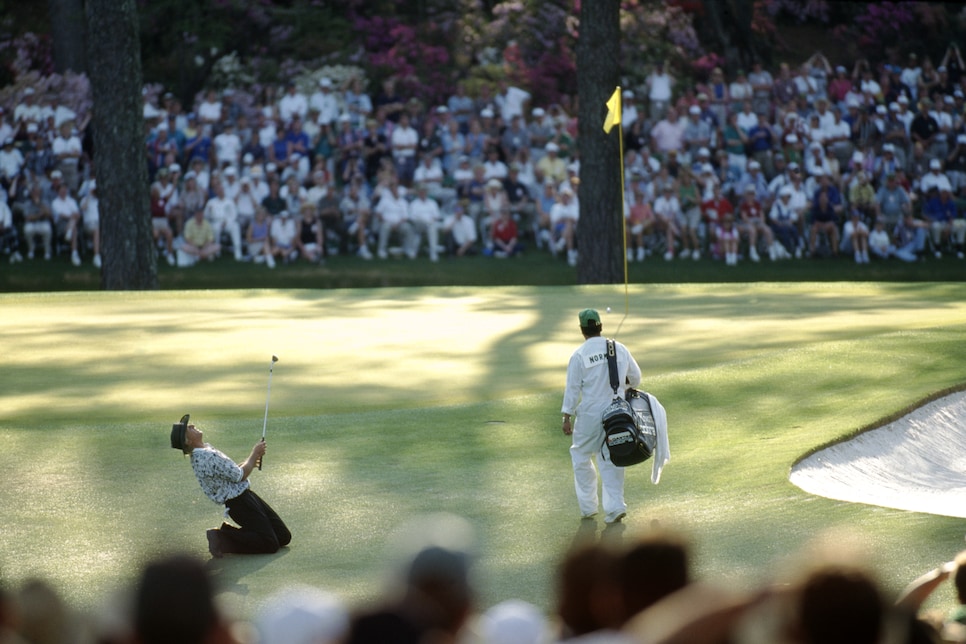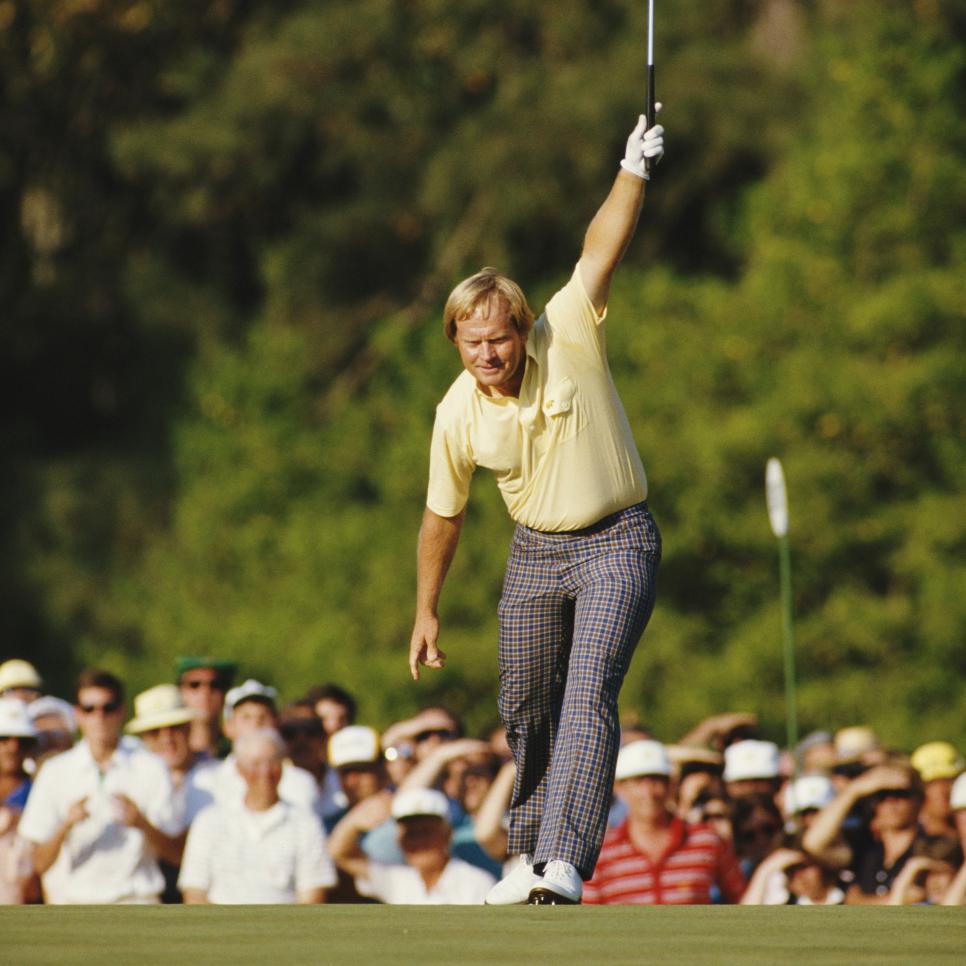News
Masters 2018: Can Rory McIlroy, Rickie Fowler or others stage a comeback? It happens more than you think

Stephen Szurlej
AUGUSTA, Ga. — As we look to Sunday afternoon’s final round of the Masters, some might wonder what the odds are of Rory McIlroy, Rickie Fowler or even Jon Rahm making a run at the title given the lead held by Patrick Reed. Certainly Reed is in command, with a three-shot advantage over McIlroy and five and six shots, respectively, over Fowler and Rahm.
History, however, says those players—McIlroy, in particular—have more than a puncher’s chance. Fifteen times in Masters history a player has come from three or more shots back over the final 18 to win and five times a six-shot or more gap has been erased. And it doesn’t always take fireworks to do so. Seven times a 69 or higher did the trick. Here’s how each of these comebacks transpired.
1935: Gene Sarazen -- 3 shots behind Craig Wood
Gene Sarazen was still three strokes behind Craig Wood in the final round as he considered club selection in the 15th fairway when Walter Hagen’s booming voice pierced the air: “Hurry up, will ya?” called his playing companion. “I’ve got a date tonight.” Sarazen, choosing his 4-wood, sped things up dramatically by holing the shot for a tieing double-eagle 2. Sarazen shot a final-round 70 and won a 36-hole playoff the next day.
1936: Horton Smith -- 3 shots behind Harry Cooper
As he had done in the 1934 Masters, Horton Smith fired a final-round 72 to win by a single stroke. The key shot was a 50-foot chip-in for birdie on 14 and a follow-up birdie on 15 to pull him even with Harry “Lighthorse” Cooper.
1950: Jimmy Demaret -- 4 shots behind Jim Ferrier
Sure, Jimmy Demaret shot a fine final-round 69. But sometimes to erase a big deficit you need some help. Jim Ferrier managed just one par on the last six holes to allow Demaret to become the first three-time winner of the Masters.
1954: Sam Snead -- 3 shots behind Ben Hogan
A second-nine double bogey by Ben Hogan was enough for Sam Snead to knot it after 72 holes at 289—the highest winning total in Masters history as Snead shot 72 to Hogan’s 75. Snead would win the 18-hole playoff 70 to 71 for his third Masters title.
1956: Jack Burke -- 8 shots behind Ken Venturi
It’s not often you can make up eight shots by shooting 71 at the Masters, but that’s what Jack Burke did. Playing in brutal winds, Burke played steady golf while the amateur Ken Venturi fell apart, shooting 80 with six three-putts.
1957: Doug Ford -- 3 shots behind Sam Snead
Doug Ford fired the lowest final round by a champion, a 66, to overtake Snead and win by three shots. Ford turned in 34 and a holed-out bunker shot for a 3 on the 18th capped a second-nine 32 that included birdies on Nos. 12, 14 and 15.
1959: Art Wall -- 6 shots behind Arnold Palmer
Birdies on five of the last six holes fueled a dramatic charge by Art Wall Jr. as he leapfrogged over a record 12 players to win by one stroke over Cary Middlecoff. Wall’s final-round 66 was his first sub-70 round in four Masters.
1978: Gary Player -- 7 shots behind Hubert Green
Gary Player blitzed the second nine in 30 on Sunday to overtake Rod Runseth, Hubert Green and Tom Watson to win the Masters at the age of 42. In the process of winning his third Masters title, the South African fired a final-round 64, which to this day remains the lowest final round by a Masters champion.
1979: Fuzzy Zoeller -- 6 shots behind Ed Sneed
Fuzzy Zoeller and Tom Watson got into the first sudden-death playoff in Masters history after Ed Sneed bogeyed the final three holes. Zoeller, who shot a final-round 70, knocked in an eight-foot birdie putt on the second extra hole to win.

David Cannon/Getty Images
1986: Jack Nicklaus -- 4 shots behind Greg Norman
A second-nine 30. A final-round 65. Heroic under any circumstances, the scores became historic when fashioned by Jack Nicklaus en route to his record sixth green coat. Nicklaus’ charge included a 12-foot eagle putt on No. 15 and a tee shot on 16 that funneled close enough for a crucial birdie followed by his famous “Yes, Sir!” putt at 17. Nicklaus, at 46, became the oldest Masters champion.
1990: Nick Faldo -- 3 shots behind Raymond Floyd
A double bogey on the first hole Sunday put defending champion Nick Faldo in a five-stroke hole but he managed to rally for a final-round 69 that knotted Ray Floyd. As he had done the previous year, Faldo won on the second extra hole of overtime.
1996: Nick Faldo -- 6 shots behind Greg Norman
Faldo hit 16 greens in a brilliant final-round 67 to win his third green coat. Overcoming a six-stroke deficit, Faldo won by five to become the sixth man to win three or more Masters. Third-round leader Greg Norman faltered with a closing 78, finishing second for the third time.
2011: Charl Schwartzel -- 4 shots behind Rory McIlroy
Never before had a played birdied the final four holes of the Masters to win the tournament, but that’s what Charl Schwartzel did in winning by two over Adam Scott and Jason Day with a final-round 66. Earlier in the round Schwartzel holed out a gap wedge on the par-4 third hole for eagle to jumpstart his charge.
2012: Bubba Watson -- 3 shots behind Peter Hanson
Bubba Watson shot a final-round 68 (that included four consecutive birdies on the second nine) to get into a playoff with Louis Oosthuizen then hit a miracle shot—a gap wedge from 164 yards out of the trees that hooked some 30 yards onto the 10th green on the second hole of the playoff to give him his first major victory.
2016: Danny Willett -- 3 shots behind Jordan Spieth
Danny Willett’s final-round 67 often gets overshadowed by Jordan Spieth’s second-nine collapse. Spieth bogeyed Nos. 10 and 11 before dunking a pair of shots in the water on the par-3 12th, leading to a quadruple bogey. Willett birdied 13 and 14 and went on to win by three.

